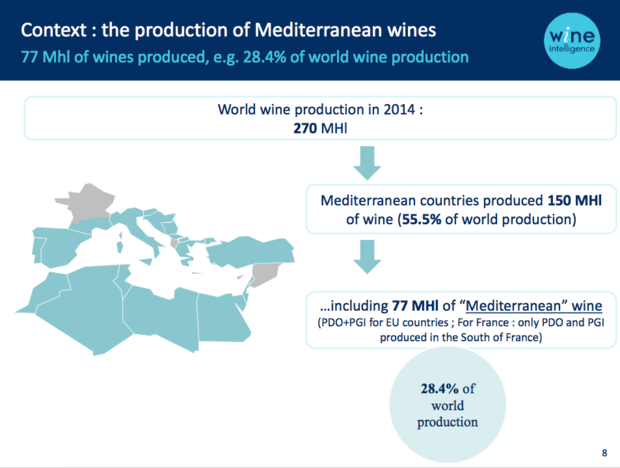
'Mediterranean wine' - A goldmine of untapped potential?
As Elizabeth Gabay MW noted elsewhere on Harpers.co.uk this week, wines from the Mediterranean showed enormous diversity at Vinisud 2017.
As Elizabeth Gabay MW noted elsewhere on Harpers.co.uk this week, wines from the Mediterranean showed enormous diversity at Vinisud 2017.
For as the fair becomes increasingly international, more and more focus is being placed on the idea of Mediterranean (Med) wines as a category, as visitors saw in the growing number of exhibitors from across this pan-coastal region.
Then there was also research commissioned by Vinisud and carried out by Wine Intelligence which looked at production and export statistics for Med wines.
Their findings pointed to the massive influence that wines from the Med have globally, accounting for 28.4% of world wine production, and 27.8% of world wine exports.
The idea that the combined influence of these wine-producing countries could lead to a new category was certainly floated at Vinisud, and it undoubtedly poses an interesting opportunity for marketing departments - especially in the UK where sun-worshiping Brits have long been sold on the delights of Mediterranean food and beaches.
But how will Med wines as a category translate to the market - and is it even useful?
"Nobody is talking about Mediterranean Wines; there's no such thing - yet," Sarah Abbott MW, who was at the fair, told Harpers.
"But there is an identity for 'Eastern Med' wines. You see this term being used to denote wines of Lebanon, Turkey and Cyprus.
"There's an issue for 'Med Wines' in that for many years the powerhouse producers of Southern France, Southern Spain and Southern Italy have been the de facto house wines of the major import markets. So if there is an association for Med Wines it is something like 'sunny and warm', 'fruity, rich, rustic' and 'cheap and quaffable' and 'wine lake'. That association is very unfair.
"Med terroirs are complex and nuanced and many have marginal climates. But Eastern Med wines have come into the market as exotic, interesting and adventurous and are at higher price points. So in a funny way, they are in a position to raise the quality perception of the whole category."
"As far as I know, the word 'Mediterranean wine' is definitely never used by consumers in a wine context and I have very rarely heard it from the trade outside of Vinisud," Jean-Philippe Perrouty, director of Wine Intelligence, concurred.
"It is sometimes used in politics with this long-time idea of a Mediterranean economic alliance. But, it's not completely alien to consumers, specifically when it comes to tourism and also food and diet."
Undoubtedly, there is untapped marketing potential in the UK where many consumers have memories of summers spent on the beaches of the continent everywhere from those typically affiliated Med countries like Spain, Italy and Greece, all the way to the Dalmatian coast.
On top of that, there is also the positive role that wine plays in the Mediterranean diet - a glass of wine a day is not only plays a central role in mealtimes, it is also considered to be a component of good health.
Add to that the opportunities offered by social media, where consumers are increasingly sharing food, holidays and experiences, not just with each other but on Twitter, Facebook and Instagram, the possibilities are ripe.
"Although nobody is talking about Mediterranean wines, many people are talking about Mediterranean diet and lifestyle," Abbott explained.
"If you look at how many people are googling 'Mediterranean diet' and tagging it on Instagram - the numbers are high.
"One of the problems is widespread misspelling - as no one seems to be able to spell 'Mediterranean'. But from a lifestyle brand perspective, Vinisud could really be onto something.
"There's been a huge amount of positive research findings about the olive and the grape, which went off and travelled the world. Mediterranean food is very social and if you look at social media and the way people are sharing food with friends, going out for dinner with sharing platters and then sharing that on Instagram and Twitter, there is a huge opportunity to tap into all that with the idea of Mediterranean wine."
Visit Harpers.co.uk tomorrow for Part 2 when we will look at the challenges posed by this category.






